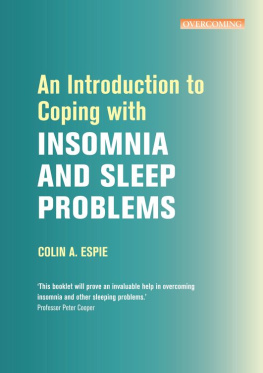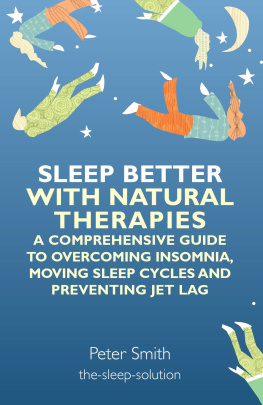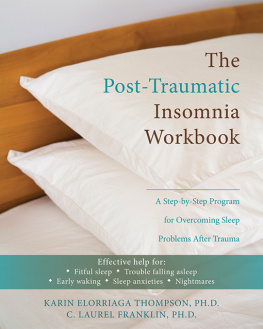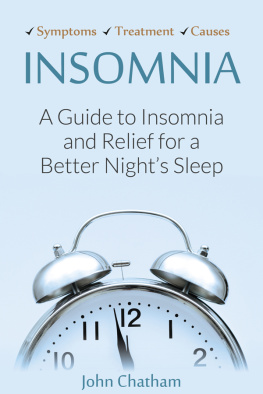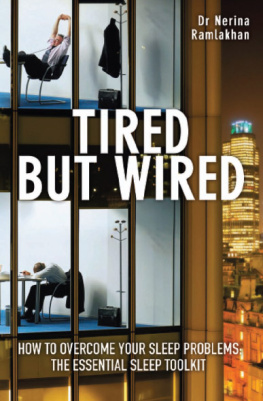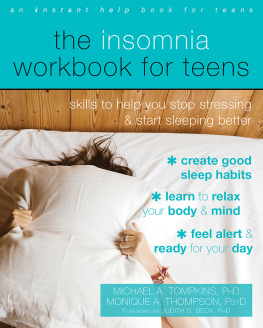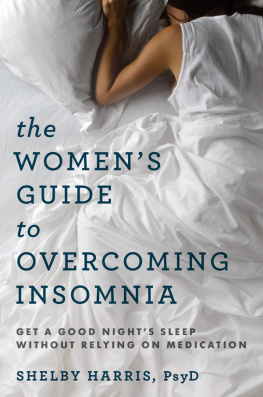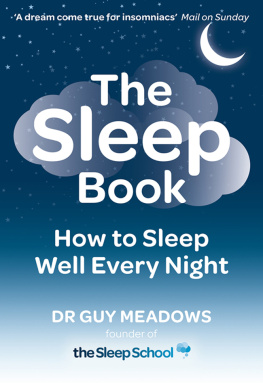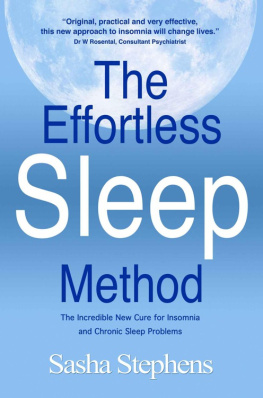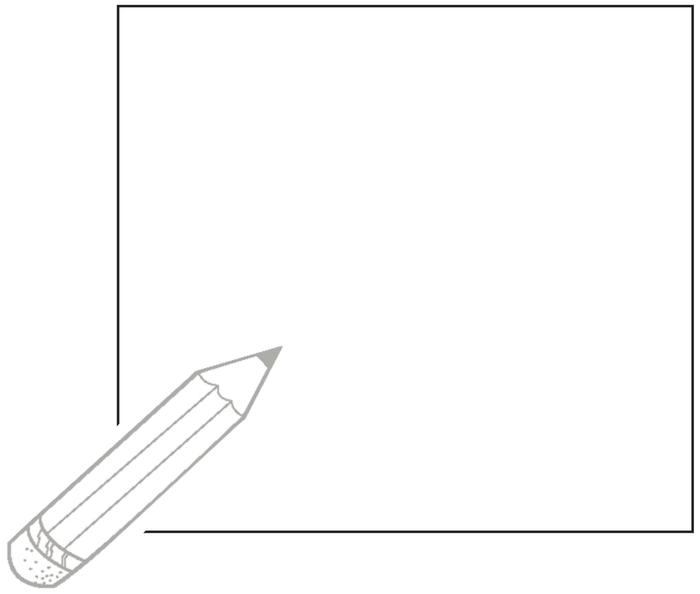Everyone has the occasional night of poor sleep, and most of us have had times when weve found it hard to get to sleep or stay asleep when were stressed or worried about something. Usually these problems go away quite quickly and normal sleep returns. However, sleeping problems can also become more constant, and this is when the term insomnia is commonly used.
The first part of this booklet sets out to help you understand what insomnia is, and also to find out about some other less-well-known sleep disorders in case they may be playing a part in your difficulties. The second part will show you some methods that you can use to help get your sleep back on track. All of the methods included in this booklet are evidence based. This means that theyve all been tested in clinical trials and shown to help, if people stick at using them. This point must be stressed because, once you have persistent insomnia (when you rarely, or never, get a good nights sleep), it can be difficult to overcome it unless youre prepared to make some changes in the way you behave and changes in the way you think about sleep.
You may well find that following this booklet will be enough to sort out your sleep problems. It would be best to follow the booklet carefully, as a short course in fixing your sleep pattern. Youll see that it is often helpful to write things down, and the booklet gives you some tools to use that will help you with this. Its also useful to read parts over again, perhaps several times. Some simple things can help many people change their routines and their way of thinking to help them sleep better.
This booklet is based on Cognitive Behavioural Therapy (CBT), which is a practical, down- to-earth approach which has a successful record in helping people with problems to transform their lives through changing the way they think and act. Of course, theres only a limited amount of material that can be provided in such a short booklet, so dont be too put off if you dont get the results youre hoping for. There are more detailed books about Cognitive Behavioural Therapy for insomnia available. Also, if you dont make as much progress as you would wish, then you should talk to your GP about your sleeping problems. This is particularly important if you think that you may have a sleep disorder other than insomnia.
Professor Colin A. Espie
Insomnia: What it Means
You probably know all too well what insomnia is! Its a miserable experience when you dont sleep well at night, and having poor sleep affects how you feel during the day. So perhaps you dont really need me to tell you!
But then again, maybe its useful to confirm whether or not you have a clinical problem with your sleep. Heres a checklist of what insomnia is. By working through this list, youll be able to sum up the nature of your night-time sleep disturbance, its effects on your day- to-day life and, overall, how bad your problem is. Youll also be able to see what type of insomnia disorder youre suffering from.
To help you, the example shown here is of a mild but persistent sleep-maintenance insomnia with daytime effects of fatigue and mood disturbance (which means that the person has had trouble sleeping one or two nights a week for several months, and so feels tired and moody during the day).
| Night-time (My problem is that ) | Check
() |
| I cant get to sleep at the start of the night | Sleep-onset Insomnia |
| I cant stay asleep during the night | Sleep-maintenance Insomnia |
| I cant get to sleep AND I cant stay asleep | Mixed Insomnia |
| Daytime (My poor sleep results in ) | Check
() |
| Fatigue or low energy |
Insomnia with Daytime Consequences |
| Daytime sleepiness |
| Mental impairments (e.g. attention, memory) |
| Mood disturbance (e.g., irritability, feeling low) |
| Poor performance (e.g. work, responsibilities) |
| Problems with others (e.g. family, friends) |
| Severity (These are problems for me ) | Check
() |
| Once or twice a week | Mild |
| 3 or more nights a week | Severe |
| For less than 3 months | Acute |
| For more than 3 months | Persistent |
Figure 1
Why dont you write down what kind of insomnia you have in this box?
Now, whatever type of insomnia you may have, try to remember this, as its quite important : insomnia is really a 24-hour disorder its not just about difficulty sleeping at night. Its also a daytime problem and, in fact, this is what drives many people to seek help. People can just about put up with not sleeping, but when theyre irritable or tired during the day, and perhaps not coping with work or relationships , as well as not sleeping, then thats quite a different matter.
Other disorders of sleep
So far so good. The next thing is to check to see if you might have any other forms of sleep disorder . Different types of sleep problems can go together, or we may think that we have one type when in fact we have another.
So heres another checklist! In each set of questions in the table opposite, youll see that theres a lead question in bold, and if you answer yes to that, you should then go on and look at the questions just beneath it. Do the same for each set of questions.
You can use Figure 2 as a kind of screening tool in case you may have difficulty with narcolepsy (which is a disorder of excessive daytime sleepiness), obstructive sleep apnoea (a sleep-related breathing disorder that also makes us really sleepy), or a sleep motor disorder (like periodic limb movement disorder or restless legs syndrome). There are also sections in Figure 2 on what we call parasomnias and circadian rhythm sleep disorders. Heres a brief word on each of these.
Parasomnias are divided into those sleep problems that happen during dreaming rapid-eye -movement (REM) sleep, such as nightmares, and those problems that occur during non-REM sleep (such as sleepwalking and night terrors). Circadian rhythm sleep disorders happen when the body-clock is out of sync with the clock on the wall. Common examples of these, which tend to be short lived, include jet lag and problems caused by shift work. In other words, the problem sorts itself out naturally over time. But there are some disorders of the body-clock which can be more long lasting.
If you answered yes to any of the five areas in Figure 2, you may wish to see your GP for further advice.
If you want to have another assessment of your sleep you can fill out the Great British Sleep Survey at www.sleepio.com. After you fill out the questions, the website will give you a report on your sleep. Sleepio is a new organization that is trying to find new ways to help people sleep better.
1. Narcolepsy
a. Do you sometimes fall asleep in the daytime completely without warning?
b. Is it impossible to resist sleep attacks during the day?
c. Do you collapse or have extreme muscle weakness triggered by extreme emotion?
d. Do you have visual hallucinations, either just as you fall asleep or when you wake in the morning?
e. Are you paralysed and unable to move when you wake up from your sleep?
(If the answer to question 1a is yes, and the answer to questions 1b or 1c or 1d or 1e is also yes, this might mean possible narcolepsy.)

